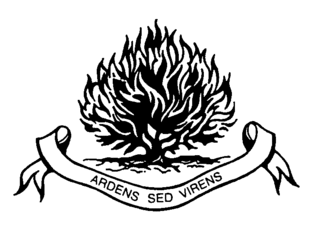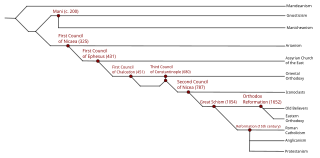
Anglicanism is a Western Christian tradition which has developed from the practices, liturgy and identity of the Church of England following the English Reformation.

Baptists are Christians distinguished by baptizing professing believers only, and doing so by complete immersion. Baptist churches also generally subscribe to the tenets of soul competency/liberty, salvation through faith alone, scripture alone as the rule of faith and practice, and the autonomy of the local congregation. Baptists generally recognize two ordinances: baptism and the Lord's supper.
Christianity is a religion based on the life and teachings of Jesus of Nazareth, as described in the New Testament. Its adherents, known as Christians, believe that Jesus Christ is the Son of God and savior of all people, whose coming as the Messiah was prophesied in the Old Testament.

The Church of Jesus Christ of Latter-day Saints, often informally known as the LDS Church or Mormon Church, is a nontrinitarian, Christian restorationist church that is considered by its members to be the restoration of the original church founded by Jesus Christ. The church is headquartered in Salt Lake City, Utah in the United States, and has established congregations and built temples worldwide. According to the church, it has over 16 million members and 67,000 full-time volunteer missionaries. In 2012, the National Council of Churches ranked the church as the fourth-largest Christian denomination in the United States, with over 6.5 million members reported by the church, as of January 2018. It is the largest denomination in the Latter Day Saint movement founded by Joseph Smith during the period of religious revival known as the Second Great Awakening.

The Church of England is the established church of England. The Archbishop of Canterbury is the most senior cleric, although the monarch is the supreme governor. The Church of England is also the mother church of the international Anglican Communion. It traces its history to the Christian church recorded as existing in the Roman province of Britain by the third century, and to the 6th-century Gregorian mission to Kent led by Augustine of Canterbury.

Easter, also called Pascha or Resurrection Sunday, is a festival and holiday celebrating the resurrection of Jesus from the dead, described in the New Testament as having occurred on the third day of his burial after his crucifixion by the Romans at Calvary c. 30 AD. It is the culmination of the Passion of Jesus, preceded by Lent, a forty-day period of fasting, prayer, and penance.

The Eastern Orthodox Church, officially the Orthodox Catholic Church, is the second-largest Christian church, with approximately 200–260 million members. As one of the oldest religious institutions in the world, the Eastern Orthodox Church has played a prominent role in the history and culture of Eastern and Southeastern Europe, the Caucasus, and the Near East. It operates as a communion of autocephalous churches, each governed by its bishops in local synods. The church has no central doctrinal or governmental authority analogous to the Pope of Rome, but the Ecumenical Patriarch of Constantinople is recognised by all as primus inter pares of the bishops.

Mormons are a religious and cultural group related to Mormonism, the principal branch of the Latter Day Saint movement of Restorationist Christianity, initiated by Joseph Smith in upstate New York during the 1820s. After Smith's death in 1844, the Mormons followed Brigham Young to what would become the Utah Territory. Today, most Mormons are understood to be members of The Church of Jesus Christ of Latter-day Saints. Some Mormons are also either independent or non-practicing. The center of Mormon cultural influence is in Utah, and North America has more Mormons than any other continent, though the majority of Mormons live outside the United States.

Methodism, also known as the Methodist movement, is a group of historically related denominations of Protestant Christianity which derive their inspiration from the life and teachings of John Wesley. George Whitefield and John's brother Charles Wesley were also significant early leaders in the movement. It originated as a revival movement within the 18th-century Church of England and became a separate denomination after Wesley's death. The movement spread throughout the British Empire, the United States, and beyond because of vigorous missionary work, today claiming approximately 80 million adherents worldwide.

Mormonism is the predominant religious tradition of the Latter Day Saint movement of Restorationist Christianity started by Joseph Smith in Western New York in the 1820s and 30s. After Smith was killed in 1844, most Mormons followed Brigham Young on his westward journey to the area that became the Utah Territory, calling themselves The Church of Jesus Christ of Latter-day Saints. Other sects include Mormon fundamentalism, which seeks to maintain practices and doctrines such as polygamy, and other small independent denominations. The second-largest Latter Day Saint denomination, the Reorganized Church of Jesus Christ of Latter-day Saints, since 2001 called the Community of Christ, does not describe itself as "Mormon", but follows a Trinitarian Christian restorationist theology, and considers itself Restorationist in terms of Latter Day Saint doctrine.

Presbyterianism is a part of the reformed tradition within Protestantism, which traces its origins to Britain, particularly Scotland.

The Seventh-day Adventist Church is a Protestant Christian denomination which is distinguished by its observance of Saturday, the seventh day of the week in Christian and Jewish calendars, as the Sabbath, and its emphasis on the imminent Second Coming (advent) of Jesus Christ. The denomination grew out of the Millerite movement in the United States during the mid-19th century and it was formally established in 1863. Among its founders was Ellen G. White, whose extensive writings are still held in high regard by the church.

The Church of Ireland is a Christian church in Ireland and an autonomous province of the Anglican Communion. It is organised on an all-Ireland basis and is the second-largest Christian church on the island after the Roman Catholic Church. Like other Anglican churches, it has retained elements of pre-Reformation practice, notably its episcopal polity, while rejecting the primacy of the Bishop of Rome. In theological and liturgical matters, it incorporates many principles of the Reformation, particularly those espoused during the English Reformation. The church self-identifies as being both Catholic and Reformed. Within the church, differences exist between those members who are more Catholic-leaning and those who are more Protestant-leaning. For historical and cultural reasons, the Church of Ireland is generally identified as a Protestant church.

Ash Wednesday is a Christian holy day of prayer, fasting, even if it is not a holy day of obligation. It is preceded by Shrove Tuesday and falls on the first day of Lent, the six weeks of penitence before Easter. Ash Wednesday is traditionally observed by Western Christians, including Anglicans, Episcopalians, Lutherans, Old Catholics, Methodists, Presbyterians, some Baptists, some Nazarenes, and most Latin Rite Roman Catholics.

A Christian denomination is a distinct religious body within Christianity, identified by traits such as a name, organization, leadership and doctrine. Individual bodies, however, may use alternative terms to describe themselves, such as church or sometimes fellowship. Divisions between one group and another are defined by authority and doctrine; issues such as the nature of Jesus, the authority of apostolic succession, eschatology, and papal primacy may separate one denomination from another. Groups of denominations—often sharing broadly similar beliefs, practices, and historical ties—are sometimes known as "branches of Christianity". These branches differ in many ways, especially through differences in practices and belief.

The Catholic Church, also known as the Roman Catholic Church, is the largest Christian church, with approximately 1.3 billion baptised Catholics worldwide as of 2017. As the world's "oldest continuously functioning international institution", it has played a prominent role in the history and development of Western civilisation. The church is headed by the Bishop of Rome, known as the Pope. Its central administration, the Holy See, is in the Vatican City, an enclave within the city of Rome in Italy.

The Episcopal Church (TEC) is a member church of the worldwide Anglican Communion based in the United States with dioceses elsewhere. It is a mainline Christian denomination divided into nine provinces. The presiding bishop of the Episcopal Church is Michael Bruce Curry, the first African-American bishop to serve in that position.

Lent is a solemn religious observance in the Christian liturgical calendar that begins on Ash Wednesday and ends approximately six weeks later, before Easter Sunday. The purpose of Lent is the preparation of the believer for Easter through prayer, doing penance, mortifying the flesh, repentance of sins, almsgiving, and denial of ego. This event is observed in the Anglican, Eastern Orthodox, Lutheran, Methodist, Moravian, Oriental Orthodox, Reformed, and Roman Catholic Churches. Some Anabaptist and evangelical churches also observe the Lenten season.

Lutheranism is a major branch of western Christianity that identifies with the teaching of Martin Luther, a 16th century German reformer. Luther's efforts to reform the theology and practice of the church launched the Protestant Reformation. The reaction of the government and church authorities to the international spread of his writings, beginning with the 95 Theses, divided Western Christianity.

Protestantism is the second largest form of Christianity with collectively between 800 million and more than 900 million adherents worldwide or nearly 40% of all Christians. It originated with the 16th century Reformation, a movement against what its followers perceived to be errors in the Roman Catholic Church. Protestants reject the Roman Catholic doctrine of papal supremacy and sacraments, but disagree among themselves regarding the real presence of Christ in the Eucharist. They emphasize the priesthood of all believers, justification by faith alone rather than by good works, and the highest authority of the Bible alone in faith and morals. The "five solae" summarise basic theological differences in opposition to the Roman Catholic Church.




















